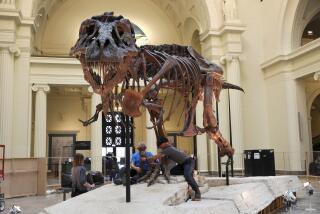A boom in bones
- Share via
IT’S SAFE TO SAY THAT WHEN dinosaurs ruled the Earth a mere 65 million years ago, few of them dreamed they’d one day be sold on EBay. And yet that’s exactly where their bones are increasingly ending up. A search late Friday found an “extremely rare museum-quality” T-rex skull for the bargain price of $295,000, although we’d suggest verifying its authenticity before handing over your AmEx.
The fact that anyone can buy dinosaur bits nowadays is a major sore point for paleontologists. That’s because the dino market is experiencing a boom among collectors who seek Jurassic memorabilia for their mantels, or even fully re-created dinosaurs for the foyers of their mansions. In 1997, McDonald’s Corp. and the Walt Disney Co. triggered a market boom when they helped Chicago’s Field Museum buy a Tyrannosaurus rex named Sue for $8.4 million. Fossil wildcatters have been digging like crazy ever since, from the Dakotas to Siberia.
But commercial diggers rarely collect all the important scientific information when they find a fossil, making many finds meaningless to paleontology. Worse, many freelancers are entering into exclusive agreements with private landowners to bar researchers from their previously hospitable property.
Most academics realize that they can’t do much to block private landowners from keeping them out, although some have been lobbying Congress for stricter regulations on fossil sales. (In the United States, unlike Canada, it’s legal to buy and sell fossils as long as they weren’t found on public property.) More recently, scientists have asked for increased monitoring of national parks for illegal bone miners.
We empathize with the scientists’ concerns, and it’s important that we help them continue their important studies. But the fact that there’s a boom in dinosaur relics seems like a good thing, not least because that will increase the total supply of fossil discoveries. Plus, just because a private collector buys a really old bone doesn’t mean it’s gone forever. Many of the world’s great museums are filled with important finds donated from private holdings.
If you ask us, a nice gentleman’s agreement is in order: If private diggers agreed to let scientists join them, they could retrieve the nonsalable scientific information and everyone could go on their way.
If not, paleontologists can take comfort from the predictions of author Michael Crichton that we could use dinosaur DNA to bring the creatures back. If he’s right, we’re guessing all those people who have velociraptors hanging on dining room walls will have a little something to worry about.


